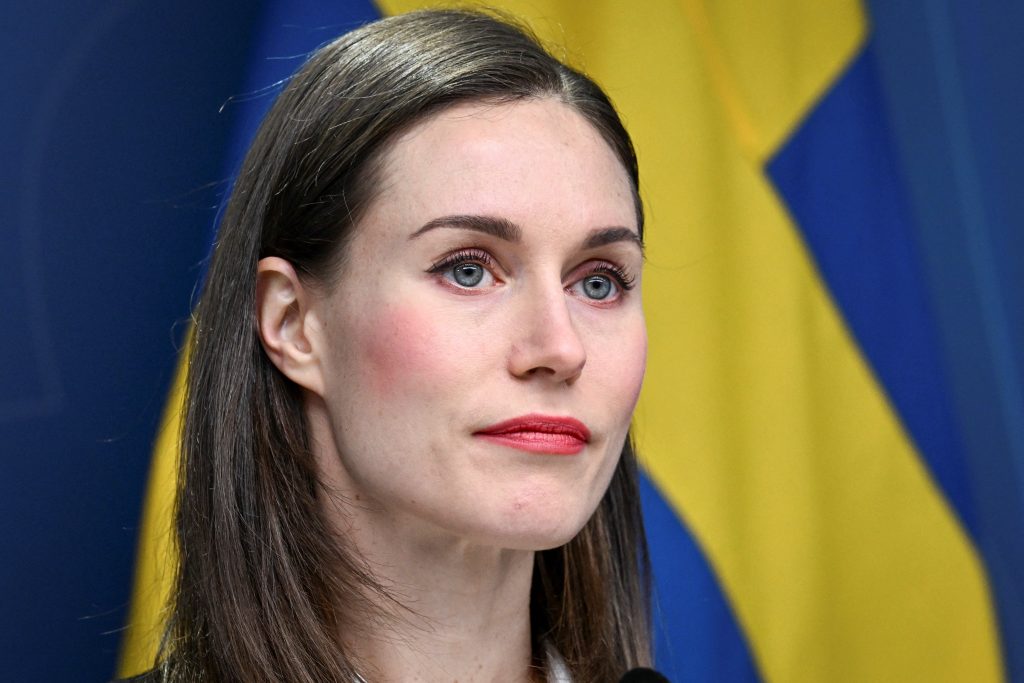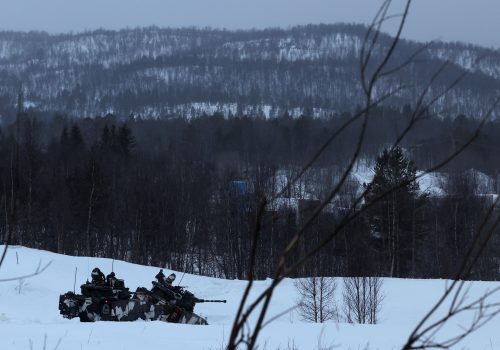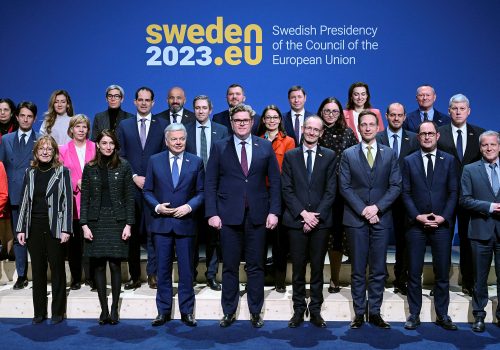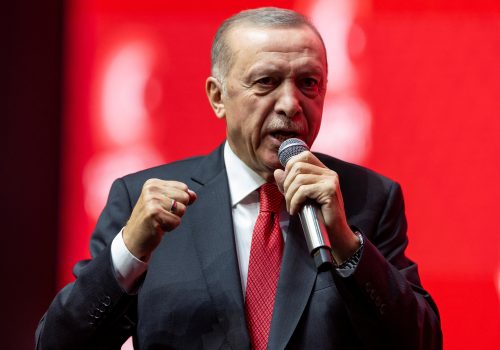Since last spring Finland and Sweden have been on a path toward NATO membership. They submitted their applications in May, and NATO countries signed the accession protocols in July, beginning the ratification process. This was precipitated by a memorandum signed by Turkey, Sweden, and Finland, before the Madrid Summit, designed to allay Turkish fears that the two applicant countries were not sufficiently committed to support Turkey in countering threats to its national security. Since then, twenty-eight out of thirty NATO countries have ratified the Finnish and Swedish accession.
The two holdouts are Hungary and Turkey. Ankara’s steps so far, starting with its willingness to sign the memorandum in Madrid, suggest its current reluctance is not about opposition to Finland and Sweden joining the Alliance from a collective-security standpoint. Instead, Turkey sees the ratification process as leverage in terms of its domestic and foreign policies—particularly its fight against the Kurdistan Workers Party (PKK), which is widely designated as a terrorist group, including by Finland and Sweden. Moreover, it seems clear that Turkey is far more likely to drag the process on without ratifying than Hungary. Hungarian Prime Minister Viktor Orbán has said ratification would be done early this year, whereas lately the diplomatic malaise in relations between Turkey and Sweden has increased the pessimism over finding a solution in the near term.
This is bad news for the Finnish and Swedish NATO processes and for their bilateral relations with Turkey. But it is also bad for the broader unity of NATO and the West. In recent days, the situation has grown even more complicated, with indications that the Finnish and Swedish NATO paths could diverge.
This would be a dramatic shift, since throughout the process Finnish and Swedish leaders have echoed their common purpose and the importance of a common accession process. Both Finnish Prime Minister Sanna Marin and Swedish Prime Minister Ulf Kristersson have underlined that the two countries are to proceed “hand in hand,” an expression used historically to denote the strength of the bilateral relationship.
Against that backdrop, experts were surprised when the Finnish foreign minister speculated in an interview in late January that a situation might arise in which Finland would proceed to NATO even if Sweden’s accession was not ratified. Naturally, Helsinki must engage in prudent planning for different scenarios, but that ought to be separate from public messaging. There is not much to gain by a top official speculating on the matter of Finland joining before Sweden and, in fact, the Finnish government messaging has pivoted back closer to the original line since those comments. However, Turkish President Recep Tayyip Erdogan seized on the possibility, too, commenting that Turkey might accept Finland into NATO without Sweden.
While It is not impossible to envision a potential future where Finland joins NATO before Sweden, decoupling the Finnish and Swedish accession process is a bad idea for both defense and broader strategic reasons.
In terms of defense planning, the Baltic Sea region should be considered as a whole. Defense plans work best when there are no pieces of the puzzle missing. In a conventional military conflict with Russia, Sweden would offer a strategic depth that Finland and the Baltic states are lacking. Furthermore, in any larger crisis Finland would be dependent on critical supply lines, most of which run through Sweden or its territorial waters.
An Alleingang, or solo effort, of Finland would be at least as problematic for foreign policy as it would for defense reasons. The strength of the West and NATO lies in unity, and this unity has been underlined in Finland and Sweden’s combined accession process.
NATO’s Secretary General Jens Stoltenberg and US Secretary of State Antony Blinken have repeatedly emphasized that the two countries will join together. Breaking from this logic could set a dangerous precedent by showing to adversaries that it is possible to create rifts and to separate European countries from each other. It would call into question the open-door policy of NATO as well as the effectiveness of its decision making in times of crisis.
It is worth keeping in mind that neither Finland nor Sweden is suffering from a critical and urgent shortage of security. Both now benefit from enhanced access to NATO structures under the Modalities for Strengthened Interaction (MSI) arrangement and have security assurances from individual NATO countries as well as at the multilateral level through the Lisbon Treaty of the European Union. Bilateral defense cooperation between Finland and Sweden is at an unprecedented level and continues to strengthen. This security is one reason the Finnish political leadership and most of the expert community has been adamant in saying that Sweden must not be left behind. They also realize that the damage to Western unity could prove long-lasting.
In the end, it may not be up to Finland: Turkey could choose to ratify the Finnish but not the Swedish accession, presenting a decoupling as a fait accompli. But any preparations for that day from Helsinki should be done in quiet consultations with partners, especially in Stockholm and Washington. Public discussion of decoupling only threatens Western unity at a critical moment.
Rasmus Hindrén is a nonresident senior fellow with the Transatlantic Security Initiative in the Atlantic Council’s Scowcroft Center for Strategy and Security and the head of international relations at the European Center of Excellence for Countering Hybrid Threats.
Further reading
Tue, Feb 7, 2023
What would happen if Sweden and Finland split up their NATO bids?
New Atlanticist By
Finland proceeding without Sweden should be a last resort because of all the strategic and logistical difficulties it would create.
Mon, Jan 30, 2023
Sweden has a chance to transform European security—even before it officially joins NATO
New Atlanticist By Franklin D. Kramer
Sweden can wield the agenda-setting powers of its presidency to push a EU security and defense budget directed toward three crucial aims: mobility, sustainment, and critical infrastructure protection.
Fri, Jan 27, 2023
What Turkey really wants from Sweden
New Atlanticist By Rich Outzen
Turkey likely will still approve Sweden's bid for NATO membership, but not until summer and only after President Recep Tayyip Erdogan gets more cooperation against the PKK.
Image: Finland's Prime Minister Sanna Marin and Sweden's Prime Minister Ulf Kristersson (not seen) hold a joint news conference at the government headquarters Rosenbad as they meet in Stockholm, Sweden, February 2, 2023. TT News Agency/Jonas Ekstromer via REUTERS ATTENTION EDITORS - THIS IMAGE WAS PROVIDED BY A THIRD PARTY. SWEDEN OUT. NO COMMERCIAL OR EDITORIAL SALES IN SWEDEN.



